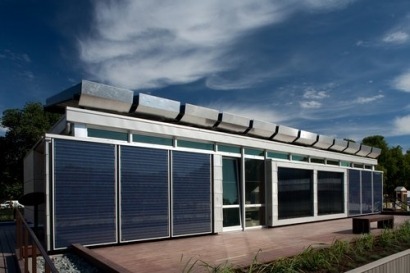
The grant funding will be provided from UK innovation agency The Technology Strategy Board (TSB) which will give construction companies, developers and architects leading the projects the opportunity to explore and test the viability of new integrated ways of working that will improve build consistency, cost-effectiveness, speed and sustainability.
“The Government has challenged industry to reduce construction costs by up to 30%, which would enable low carbon buildings to be constructed for the cost of a standard building” said Iain Gray, Chief Executive of the Technology Strategy Board. “The work we are funding will encourage the UK construction industry to undertake a fundamental rethink of current ways of working and enable businesses to explore potential commercial opportunities created by novel design, procurement and construction processes.”
The research and development projects will be led by: A2 Dominion Group (Oxford), Balfour Beatty Construction Northern Ltd (Manchester), Edward Cullinan Architects Ltd (London), Grimshaw Architects LLP (London), Rider Levett Bucknall (Birmingham), Skanska Technology (Rickmansworth, Herts), The Clarkson Alliance (Oxford) and Willmott Dixon Capital Works (Birmingham).
A2 Dominion’s Bicester Eco-town Process Improvement Toolkit (BEPIT) research project will employ a forensic mapping method to highlight process failures in technologically innovative build systems. This will inform the creation of a best practice toolkit for use on later phases of their North West Bicester eco-town development, and then across the UK.
The project led by London-based architects Grimshaw will develop and trial a lightweight, modular timber system for the retail and industrial markets that is cost effective, faster to build and intrinsically more sustainable than current steel portal frame sheds. The 2-year programme – which will include trialling the system on a retail/distribution store – aims to demonstrate that low carbon, innovative and inspiring buildings can be delivered in the retail shed sector.
Skanska Technology’s project aims to enable a fundamental rethink of the use of offsite manufacture in construction. This will enable the delivery of high quality, low carbon buildings at affordable levels. Current procurement is limited by a lack of supply chain coordination and prohibitive costs. Near Site Manufacture using Modern Flying Factories (MFFs) will be combined with virtual-reality-enabled supply chain management & process improvement. These will deliver a new lean procurement and construction process for delivering low CO2 buildings at scale. MFF concepts will be trialled on a school building programme in Bristol and tested in other construction sectors by Skanska.
The grant funding from the Technology Strategy Board totals £3.78 million and the overall value of the R&D, including contributions from the participating companies, is £7.6 million. Individual grants to each project range from £150,000 to £780,000.
The grant awards follow the conclusion of the “Rethinking the Build Process” competition for collaborative research and development, which was managed by the Technology Strategy Board through its Low Impact Buildings Innovation Platform (LIBIP).
The LIBIP aims to help the UK construction industry deliver buildings with a much lower environmental impact. The Government has set a target of an 80% reduction in CO2 emissions in the UK by 2050. As 45% of total UK carbon emissions come from buildings, delivering low carbon new buildings, and reducing the environmental impact of existing buildings, is a major challenge. The LIBIP invests jointly with industry and other funders in projects to bring innovative solutions to the growing market for more environmentally friendly buildings, and to overcome barriers to the wider use of existing solutions. The LIBIP addresses the challenge of both new and existing buildings.
Further information:

